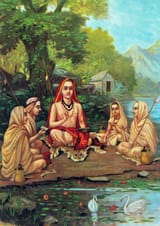Search Results
6/21/2025, 3:39:44 PM
>>24484438
Everywhere they apply their method of the seven standpoints — from one point of view it (anything) exists, from one point of view it does not exist, from one point of view it both exists and does not exist, from one point of view it is indescribable, from one point of view it is existent and indescribable, from one point of view it is non-existent and indescribable, from one point of view it is both existent and non-existent and also indescribable. They apply their method of the seven standpoints even to such items as oneness and eternity.
To all this we reply that the relativism of the Jainas is not justified, because, as the author of the Sutras puts it, ‘of the impossibility (of directly contradictory attributes) in one and the same thing’. You cannot have contradictory attributes such as ‘existent’ and ‘non-existent’ at the same time in the same substance, any more than the same thing can be at the same time hot and cold. The seven principles, which they regard as existent and as having definite natures, must either exist with those natures or not exist. If all that we have is the indefinite knowledge that a certain thing might be of such and such a nature, or of a different nature, or not of that previously assumed nature, then our knowledge is like doubt and has no cogency.
Perhaps you will say that the definite knowledge that a thing is many-sided does not lack cogency, like doubt. But we reply that you are wrong. For even the definite knowledge of one who recklessly extends the principle of relativism to cover all entities is itself an entity, and falls within his own formula, ‘From one point of view it is, from one point of view it is not, etc.,’ and is hence itself not of a definite nature. In the same way, both the one who has the definite knowledge, and also the cognition resulting from the process of knowledge, will exist from one standpoint and not from another. This being so, how can a Jaina set himself up as an authority and give teaching, when neither the means of knowledge nor the object of knowledge nor the knower of knowledge nor the knowledge itself can be asserted to have any definite existence? And how could he have pupils who acted on his teaching, seeing that its exact nature could never be definitely ascertained? For people in the world wait until they are sure that something will have an advantageous result for them and then apply themselves calmly to the proper means for attaining that thing: they do not act without such knowledge. One attempting to propagate a science which is itself by its very nature beyond definite determination as ‘such and such’ can expect to find his words neglected like those of a drunkard or a lunatic
Everywhere they apply their method of the seven standpoints — from one point of view it (anything) exists, from one point of view it does not exist, from one point of view it both exists and does not exist, from one point of view it is indescribable, from one point of view it is existent and indescribable, from one point of view it is non-existent and indescribable, from one point of view it is both existent and non-existent and also indescribable. They apply their method of the seven standpoints even to such items as oneness and eternity.
To all this we reply that the relativism of the Jainas is not justified, because, as the author of the Sutras puts it, ‘of the impossibility (of directly contradictory attributes) in one and the same thing’. You cannot have contradictory attributes such as ‘existent’ and ‘non-existent’ at the same time in the same substance, any more than the same thing can be at the same time hot and cold. The seven principles, which they regard as existent and as having definite natures, must either exist with those natures or not exist. If all that we have is the indefinite knowledge that a certain thing might be of such and such a nature, or of a different nature, or not of that previously assumed nature, then our knowledge is like doubt and has no cogency.
Perhaps you will say that the definite knowledge that a thing is many-sided does not lack cogency, like doubt. But we reply that you are wrong. For even the definite knowledge of one who recklessly extends the principle of relativism to cover all entities is itself an entity, and falls within his own formula, ‘From one point of view it is, from one point of view it is not, etc.,’ and is hence itself not of a definite nature. In the same way, both the one who has the definite knowledge, and also the cognition resulting from the process of knowledge, will exist from one standpoint and not from another. This being so, how can a Jaina set himself up as an authority and give teaching, when neither the means of knowledge nor the object of knowledge nor the knower of knowledge nor the knowledge itself can be asserted to have any definite existence? And how could he have pupils who acted on his teaching, seeing that its exact nature could never be definitely ascertained? For people in the world wait until they are sure that something will have an advantageous result for them and then apply themselves calmly to the proper means for attaining that thing: they do not act without such knowledge. One attempting to propagate a science which is itself by its very nature beyond definite determination as ‘such and such’ can expect to find his words neglected like those of a drunkard or a lunatic
Page 1
